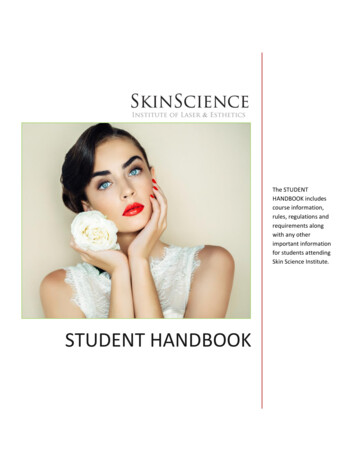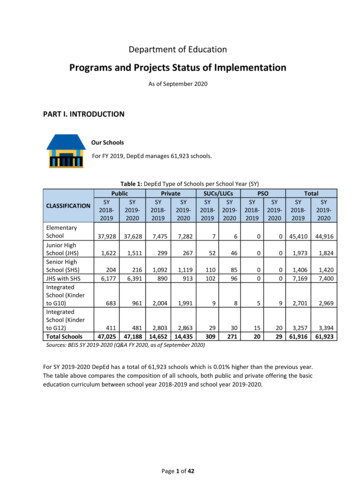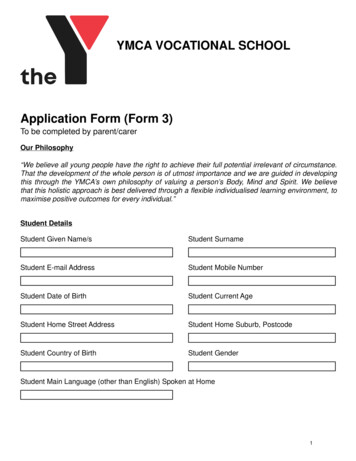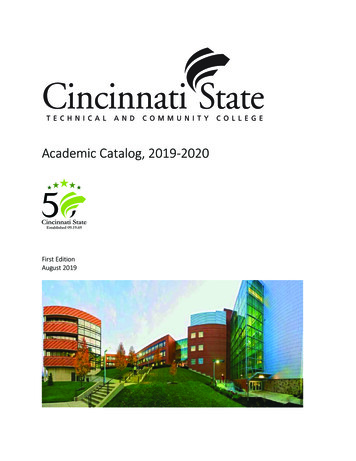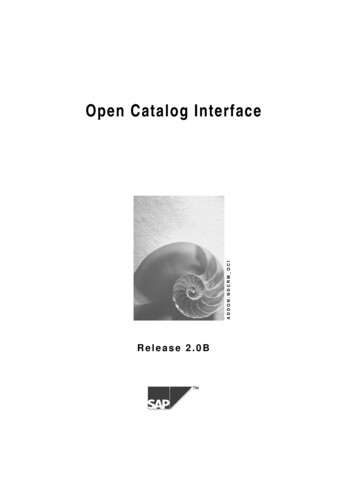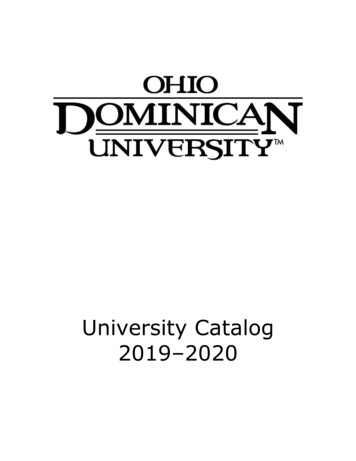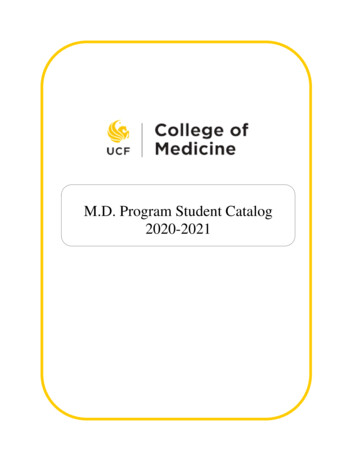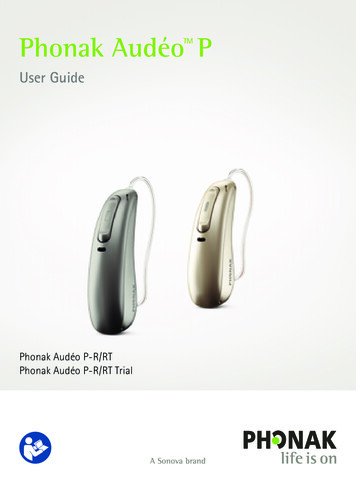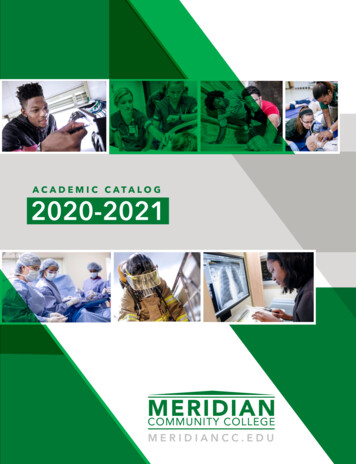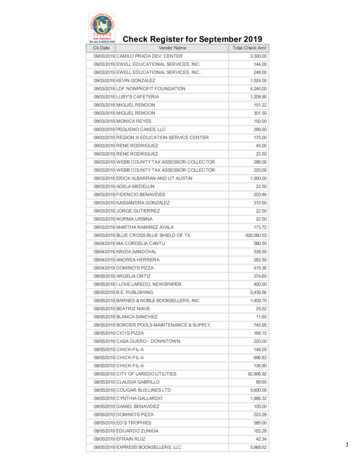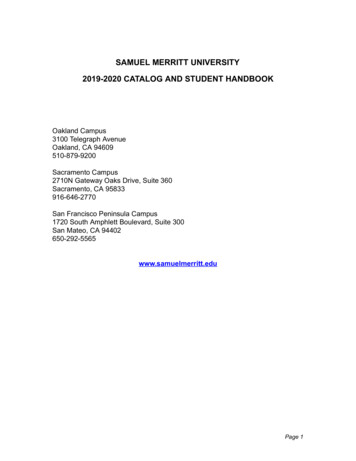
Transcription
9/23/20192019-20 Catalog Working Copy - Google DocsSAMUEL MERRITT UNIVERSITY2019-2020 CATALOG AND STUDENT HANDBOOKOakland Campus3100 Telegraph AvenueOakland, CA 94609510-879-9200Sacramento Campus2710N Gateway Oaks Drive, Suite 360Sacramento, CA 95833916-646-2770San Francisco Peninsula Campus1720 South Amphlett Boulevard, Suite 300San Mateo, CA 94402650-292-5565www.samuelmerritt.eduPage MpEqzw1JaWQ5d9a6IhQEvQJXr8EDFY/edit1/318
9/23/20192019-20 Catalog Working Copy - Google DocsCatalog & Handbook StatementThe provisions of this catalog and student handbook reflects informationavailable as of the date of publication. The provisions of this catalog and studenthandbook are subject to change and do not constitute an irrevocable contractbetween any student and Samuel Merritt University. New policies and policychanges are emailed to the University community and posted two weeks prior toimplementation on the University website.Affirmation of NondiscriminationSamuel Merritt University does not discriminate on the basis of race, religion,color, sex, pregnancy, ethnicity, national origin (including ancestry), citizenshipstatus, familial status, disability, age, sexual orientation, gender, gender identity,veteran or military status (including special disabled veteran, Vietnam-eraveteran, or recently separated veteran), predisposing genetic characteristics orany other protected category under applicable local, state or federal law,including protections for those opposing discrimination or participating in anyresolution process within the University or within the Equal EmploymentOpportunity Commission or other human rights agencies. Nondiscrimination isconsonant with the principles and practice of the University and is in compliancewith Title VII of The Civil Rights Act of 1964, as amended, Title IX of TheEducation Amendments of 1972, and section 504 of the Rehabilitation Act of1973.AccreditationSamuel Merritt University is accredited by the regional accrediting association,the WASC Senior College and University Commission (WSCUC). Professionalprograms of the University are accredited by specialized accrediting agencies.This Page provides information on each of the agencies by which the Universityand its programs were accredited at the time of publication of this catalog andstudent handbook.Page MpEqzw1JaWQ5d9a6IhQEvQJXr8EDFY/edit2/318
9/23/20192019-20 Catalog Working Copy - Google DocsHISTORY OF SAMUEL MERRITT UNIVERSITYSMU Program HistoryDegreeNursing*Nursing* (Intercollegiate Nursing Program)Nursing* RN-BSN optionNursing Program for CollegeGraduates/FastTrack BSN*Master of Physical Therapy*Nursing (Administration*, High RiskPopulations*)Nursing (Family Nurse Practitioner)Physical Therapy Post-ProfessionalMaster of Science*Nursing (Nurse Anesthesia & MedicalSurgical*)Master of Occupational Therapy*Nursing (Entry-Level Master’s for collegegraduates)Nursing (Case Management)Nursing (RN-BSN-MS with Saint Mary’sCollege)*Health and Human Sciences*Master Physician AssistantNursing (On-line Degree Completion forAdvanced Practice Nurses)*Nursing (Entry-Level Master’s for collegegraduates) – Sacramento RegionalLearning CenterDoctor of Physical TherapyDoctor of Podiatric Medicine**Nursing (Partnership Programs)*Nursing (Accelerated BSN)Nursing (Doctor of Nursing Practice)Nursing (RN to BSN)Doctor of Occupational gram discontinued**Originally established at the California College of Podiatric Medicine in1914.Page MpEqzw1JaWQ5d9a6IhQEvQJXr8EDFY/edit3/318
9/23/20192019-20 Catalog Working Copy - Google DocsMission, Vision, and ValuesPrinciples of CommunityWe're guided by SMU's principles of community. We affirm the value of human diversity, respecting our differences whileacknowledging our common humanity We affirm the inherent dignity and value of every person and strive tomaintain a climate based on mutual respect, fairness, and inclusion,calling for civility and decency in our personal interactions, regardless ofposition or status in the academy We respect the right of freedom of expression within our community andvalue the different perspectives of others, recognizing and appreciatingthese differences builds trust and contributes to the excellence of theuniversity We challenge all forms of behavior that are prejudicial, discriminatory, anddetrimental or contrary to the values expressed in this document; and wetake responsibility for increasing our own understanding of these issuesthrough education and our interactions with one another As a community, we are committed, individually and collectively, toembodying and safeguarding these principlesPage MpEqzw1JaWQ5d9a6IhQEvQJXr8EDFY/edit4/318
9/23/20192019-20 Catalog Working Copy - Google DocsACADEMICSOrganization of Academic ProgramsSamuel Merritt University offers baccalaureate, master’s and doctoral programsin two professional Schools (Nursing and Podiatric Medicine) and threedepartments (Occupational Therapy, Physical Therapy, and Physician Assistant).TECHNICAL STANDARDSIn accord with Institutional Learning Outcomes, specified program outcomes, andlicensure requirements for each health science program, enrolled students areexpected to complete all academic and clinical requirements of their respectiveprogram. Students should refer to the cognitive, affective, and psychomotorskills deemed essential to the completion of their program. Technical standardsare published on the University website and are available from the DisabilityResource Center (DRC) upon request.PHILOSOPHY OF TEACHING AND LEARNINGThe philosophy of teaching and learning at Samuel Merritt University consists ofa system of beliefs and values about the partnership between faculty membersand students in the teaching and learning process. Our philosophy is directedtoward the preparation of health care practitioners whose practice is planned andcoordinated around the unique qualities of each person served. Our philosophyrequires that our graduates use sound reasoning that incorporates the currentbest evidence, their clinical expertise, and the preferences of the people served.In the partnership between student and faculty, we believe that the responsibilityfor effective learning ultimately rests with the student. Our partnership honorsand respects the varied life experiences students bring to the learningenvironment. Learning is a social process and takes place within the context ofthe learner’s life style, culture, and readiness to learn. Process, outcomes, andcompetencies are integral to the educational enterprise.Faculty members, as the experts in the discipline and in the academy, have theresponsibility to establish an environment conducive to learning, exhibit expertisewithin their discipline, and facilitate learning through the use of current, bestpractices of effective teaching and learning.Programs, curricula, and courses are designed to value active, experientiallearning and collegial, scholarly, and effective interaction among students andfaculty. Faculty members have a fiduciary responsibility for the students whotrust us to create an effective learning environment. We believe that clinical andpractical applications, grounded in the basic sciences, social sciences, andPage MpEqzw1JaWQ5d9a6IhQEvQJXr8EDFY/edit5/318
9/23/20192019-20 Catalog Working Copy - Google Docshumanities, provide a critical foundation for learning in the health professions.Ultimately, the responsibility our graduates have for the health of the people theyserve requires that they integrate, apply, and critically evaluate their learningthroughout all phases of their health professional education.COURSE CREDITS AND COURSE NUMBERING SYSTEMSamuel Merritt University uses the semester unit system for representing coursecredits. One unit is awarded for each hour of classroom work per week, with theexpectation that students will spend an additional three hours per week in studyoutside of the classroom. A semester normally includes 14-16 weeks ofinstruction. Thus a class which meets for at least fifty minutes three times perweek is credited as three semester units of credit. Undergraduate laboratorywork is credited at one unit per three contact hours. One hundred and twentysemester units is the minimum required for a baccalaureate degree and thirty-sixsemester units of credit is the minimum required for the award of a master’sdegree at Samuel Merritt University. The course numbering system is asfollows:Undergraduate Courses000-099100-199400-499Assigned to Lower Division CoursesAssigned to Upper Division CoursesAssigned to RN to BSN CoursesGraduate Courses500-599Assigned to courses taught at the graduate level inpreparation for a graduate degree program600-699Assigned to courses at the master’s level700-799Assigned to courses at the doctoral level* The letter L is used to denote laboratory courses or sections.SMU Institutionally Established EquivalencyA credit hour is defined as an amount of work that reasonably approximates onehour of classroom or direct faculty instruction and a minimum of two hoursout-of-class student work each week (Carnegie Unit Definition), for approximatelyfifteen weeks or the equivalent of one semester.This policy makes no attempt to award units to clinical or laboratory hours by anystandard methodology. The University’s expectation is that clinical or laboratoryratios may vary by program.Page MpEqzw1JaWQ5d9a6IhQEvQJXr8EDFY/edit6/318
9/23/20192019-20 Catalog Working Copy - Google DocsCurriculum OverviewsBACHELOR OF SCIENCE IN NURSINGStudents looking to earn a Bachelor of Science in Nursing (BSN) may enter theUniversity in one of three ways:1. Transfer Entry: Samuel Merritt University admits transfer students in thefall and spring semesters.2. Accelerated Bachelor of Science in Nursing (ABSN): The ABSN isdesigned for someone who has his/her bachelor’s degree in a non-nursingfield. The ABSN is completed in 12 months of intensive nursing theorycourses and clinical education. The ABSN program is offered in Oakland,San Francisco Peninsula, and Sacramento.3. RN to BSN Program: The RN to BSN program is designed for workingRegistered Nurses who want to earn a BSN. Admission is in spring,summer, and fall semesters. The program is part time (6 units persemester) over five semesters (20 months). Students are expected totake all courses in a semester and each semester in sequence.For more information on any of these programs, please contact the Office ofAdmission or visit the Samuel Merritt University website(www.samuelmerritt.edu).GoalsThe goals of the Baccalaureate Nursing Programs are to: Educate professionals who are grounded in the liberal arts and thediscipline of nursing and who demonstrate competence in practice, skillsin inquiry, and who are guided by ethical and humanistic values. Offer baccalaureate education in nursing for learners with variededucational and cultural backgrounds who are capable of providing healthcare to diverse client populations and exercising leadership in a variety ofsettings. Provide a forum for analysis of issues in nursing and health care thatsupports the preparation of graduates who are client advocates and whoare able to facilitate change in health care environments. Provide an environment in which faculty and students engage in scholarlyactivities in order to contribute to the body of nursing knowledge throughpractice, education, and research. Prepare graduates who are consumers of research with an ability totranslate research findings into practice and who are prepared forgraduate education. Prepare graduates who contribute to the advancement of nursing as aprofession and to the improvement of health care through participation inprofessional organizations.Page MpEqzw1JaWQ5d9a6IhQEvQJXr8EDFY/edit7/318
9/23/20192019-20 Catalog Working Copy - Google Docs Prepare professionals who are capable of exercising citizenship in a worldcommunity and have an appreciation for community service, life-longlearning, and an enriched human existence.CurriculumEducation for the professional nurse emphasizes liberal and professionaleducation, skilled nursing practice, values, and attitudes. The curriculum for thepreparation of the nurse in the Baccalaureate Nursing Programs is based uponthe philosophy of the faculty and student learning outcomes, as well asknowledge and theory from various disciplines and nursing. The liberal learningand science requirements from our partner colleges have been designed to meetboth Samuel Merritt University’s requirements for liberal learning as well as thoserequired by our accreditation bodies. Four major concepts are used to provideorganizational focus in nursing courses. These concepts include person,environment, health, and nursing.Program Learning OutcomesThe prelicensure nursing programs, built upon a foundation of science and liberalarts education, prepare individuals for beginning professional practice andprovide a foundation for graduate study. Based upon the School’s philosophyand purposes, upon graduation, the student will:1. Demonstrate respect for the inherent dignity of individuals and groups inthe delivery of nursing care within an appropriate moral, ethical and legalframework.2. Integrate theory, research and knowledge from nursing, the physical,behavioral sciences, and humanities to improve the quality of careprovided to clients.3. Use effective communication principles in facilitating professionalrelationships with clients, families, and health care system colleagues.4. Demonstrate clinical reasoning in planning, delivering and evaluating caredirected at disease prevention, health promotion and restoration, acrossthe life span to diverse clients.5. Critically analyze research findings for application in the provision oftherapeutic, evidence-based nursing interventions.6. Analyze the effects of changing social, cultural, legal, economic, globalpolitical and ethical trends on healthcare policy, financing and regulatoryenvironments.7. Collaborate effectively with multidisciplinary practitioners to promoteillness prevention and the health and welfare of individuals, families andcommunities.8. Apply standards of practice within an ethical decision making frameworkin the provision of nursing care that meets clients’ health care needs.Page MpEqzw1JaWQ5d9a6IhQEvQJXr8EDFY/edit8/318
9/23/20192019-20 Catalog Working Copy - Google Docs9. Use leadership and management principles in the delegation andsupervision of nursing care while retaining accountability for the quality ofcare given to the client.10. Use emerging health care information technologies to evaluate client careand advance client education.11. Articulate a philosophy of self-care and professional development.Bachelor of Science in Nursing DegreeDegree RequirementsAdmission to the Samuel Merritt University BSN program is dependent uponseveral factors, including completion of all required prerequisites with a grade ofC or higher prior to the start of the program. A prerequisite GPA will beconsidered and it is strongly recommended that this GPA exceed a 3.0. TheHESI Admission Assessment (A2) is also used in determining admission and isrequired for all applicants by the deadline date for applications. While there areno minimum required scores, it is highly suggested that HESI A2 scores meet orexceed the national score averages. Successful completion of a criminalbackground check, required health forms and BLS for Healthcare Providers arealso required prior to matriculation (See “Background Check and Drug ScreenPolicy”).BSN Graduation Requirements:1. Minimum of four (4) semesters of full-time study.2. Completion of all courses stipulated by the program with a cumulativeGPA of no less than 2.0.3. Completion of all clinical practice hours as stipulated by the program.4. Satisfactory discharge of all university and program debts.5. Satisfactory completion of all program outcomes.BSN Curriculum OverviewYears Three and FourJUNIOR YEAR - 33 UNITSJUNIOR ONE:NURSG 111Pathopharmacology for Nursing Practice INURSG 125/125L Health Assessment INURSG 129/129L Psychiatric/Mental Health NursingNURSG 137Introduction to Professional NursingTotal3.04.05.03.015.0Page MpEqzw1JaWQ5d9a6IhQEvQJXr8EDFY/edit9/318
9/23/20192019-20 Catalog Working Copy - Google DocsJunior Two:NURSG 112NURSG 127/127LNURSG 128GENEDPathopharmacology for Nursing Practice IIManaging Care of Adults I-IIHealthy AgingGeneral EducationTotalSENIOR YEAR - 34 UNITSSenior One:NURSG 108Nursing ResearchNURSG 144/144L Care of the Childbearing FamilyNURSG 158/158L Nursing Care of Infants, Children & Youth Pop.NURSG 164/164L Managing Care of Adults IIITotalSenior Two:NURSG 160NURSG 170/170LNURSG 190LGENEDNursing Leadership, Mgmt, & Health PolicyCommunity Health NursingSenior SynthesisGeneral EducationTotalTotal 17.067.0Accelerated BSN Program (ABSN)The School of Nursing offers an accelerated baccalaureate program (ABSN) forcandidates with degrees in other fields. The program recognizes eachindividual’s past experiences and academic achievements and builds upon theseassets. It provides a mechanism for graduates with non-nursing degrees tochange careers efficiently and effectively. Because of these basic premises, thecurriculum is different from the traditional BSN.The program is designed to be completed in 12 months. The curriculum includesthree terms of intensive study at a rapid pace. Although the curriculum andformat are different from Samuel Merritt’s traditional BSN program, the goals,student learning outcomes, and foundational concepts are the same.The ABSN is offered on the Oakland campus, the Sacramento Campus, and theSan Francisco Peninsula Campus in San Mateo.Page xMpEqzw1JaWQ5d9a6IhQEvQJXr8EDFY/edit10/318
9/23/20192019-20 Catalog Working Copy - Google DocsAccelerated BSN Graduation Requirements:1. Minimum of three (3) semesters of full-time study.2. Completion of all courses stipulated by the program with a cumulative GPA ofno less than 2.0.3. Completion of all clinical practice hours as stipulated by the program.4. Satisfactory discharge of all university and program debts.5. Satisfactory completion of all program outcomes.ABSN Curriculum OverviewCOURSENURSG 125/125LNURSG 138NURSG 120/120LNURSG 126/126LNURSG 128NURSG 136/136LNURSG 108NURSG 144/144LNURSG 158/158LNURSG 164/164LNURSG 129/129LNURSG 170/170LNURSG 160NURSG 181DESCRIPTIONSemester IHealth Assessment IIntroduction to Professional Nursing and theHealth Care Delivery SystemManaging Care of Adults IHealth Assessment IIHealth AgingManaging Care of Adults IITotalTOTALUNITS2.52.05.02.52.05.019.0Semester IINursing ResearchCare of the Childbearing FamilyNursing Care of Infants, Children and YouthPopulationsManaging Care of Adults IIITotal5.017.0Semester IIIPsychiatric/Mental Health NursingCommunity Health NursingLeadership/Management/Health Care PolicySenior ge xMpEqzw1JaWQ5d9a6IhQEvQJXr8EDFY/edit11/318
9/23/20192019-20 Catalog Working Copy - Google DocsRN to BSN ProgramSamuel Merritt University’s RN to BSN program is designed to helpworking RNs gain the attitudes, skills, and knowledge needed to changehealth care delivery. As a RN to BSN student, you will start the programwith a meditation course to help strengthen your therapeutic presenceand enrich your self-care practices. You will deepen your knowledge ofthe evidence and science that supports expert nursing care. You willhone your communication and teamwork skills. Because much of thehealth care system is designed for industry rather than patients, we willbuild your confidence and leadership skills to transform “deliverysystems” into healing environments.Program Learning OutcomesThe RN to BSN nursing program builds on a foundation of science and liberalarts, strengthens professional practice, and provides a foundation for graduatestudy. Based on the School’s philosophy and purposes, upon graduation,learners will:1.Demonstrate respect for the inherent dignity of individuals and groups inthe delivery of nursing care within an appropriate moral, ethical and legalframework.2.Integrate theory, research and knowledge from nursing, the physical,behavioral sciences, and humanities to improve the quality of careprovided to clients.3.Use effective communication principles in facilitating professionalrelationships with clients, families, and health care system colleagues.4.Demonstrate clinical reasoning in planning, delivering and evaluating caredirected at disease prevention, health promotion and restoration, acrossthe life span to diverse clients.5.Critically analyze research findings for application in the provision oftherapeutic, evidence-based nursing interventions.6.Analyze the effects of changing social, cultural, legal, economic, globalpolitical and ethical trends on healthcare policy, financing and regulatoryenvironments.7.Collaborate effectively with multidisciplinary practitioners to promoteillness prevention and the health and welfare of individuals, families andcommunities.8.Apply standards of practice within an ethical decision making framework inthe provision of nursing care that meets clients’ health care needs.9.Use leadership and management principles in the delegation andsupervision of nursing care while retaining accountability for the quality ofcare given to the client.Page xMpEqzw1JaWQ5d9a6IhQEvQJXr8EDFY/edit12/318
9/23/20192019-20 Catalog Working Copy - Google Docs10.Use emerging health care information technologies to evaluate client careand advance client education11.Articulate a philosophy of self-care and professional development.CurriculumEducation for the professional nurse builds on the liberal arts and sciences andskilled nursing practice, values, and attitudes. The RN to BSN curriculum isgrounded in Caring Science, and applicable knowledge and theory from nursingand other disciplines. The RN to BSN program is a part-time program withsequential coursework. Students are expected to take all courses in a semesterand each semester in sequence. Normally all courses are taken in residence.RN to BSN Graduation Requirements1.Completion of all courses stipulated by the program and the SMU Schoolof Nursing, with a cumulative GPA of no less than 2.0.2.Satisfaction of the program’s residency requirement (30 credits).RN TO BSN CURRICULUM OVERVIEWTERM IGENED 410Mindfulness Based Stress ReductionGENED 431Applied Research & Statistics IGENED 440Health Policy INURSG 460Quality, Safety & Leadership ICohorts starting Spring 2020GENED 400MBSR & Neuroscience of ChangeGENED 435Applied Research & Statistics ITotalTERM IIGENED 432Applied Research & Statistics IIGENED 442Health Policy IIGENED 456Genetics & GenomicsNURSG 470/470L Community/ Public Health Nursing ICohorts starting Spring 2020GENED 444Health PolicyNURSG 436Applied Research & Statistics IINURSG 460Quality, Safety & Leadership 0TERM IIIPage xMpEqzw1JaWQ5d9a6IhQEvQJXr8EDFY/edit13/318
9/23/20192019-20 Catalog Working Copy - Google DocsGENED 433Applied Research & Statistics IIINURSG 450Nursing Science INURSG 464Quality, Safety & Leadership IINURSG 472/472L Community/ Public Health Nursing IICohorts starting Spring 2020GENED 490Humanities and the Human ConditionNURSG 464Quality, Safety & Leadership IINURSG 475Community/Public Health Nursing1.01.02.02.0Total6.0TERM IVNURSG 434Applied Research & Statistics IVNURSG 452Caring Science INURSG 466Quality, Safety & Leadership IIICohorts starting Spring 2020NURSG 452Caring Science INURSG 466Quality, Safety & Leadership IIINURSG 475LCommunity/Public Health Nursing PracticumTotalTERM VNURSG 454Caring Science IINURSG 468Quality, Safety & Leadership IVGENED 490Humanities and the Human ConditionCohorts starting Spring 2020GENED 456Genetics & GenomicsNURSG 454Caring Science IINURSG 468Quality, Safety & Leadership IVTotalTotal 2.06.032.0 unitsMASTER OF SCIENCE DEGREE IN NURSINGDescriptionThe graduate program in nursing prepares nurses for advanced roles. Aminimum of 36 semester units of study is required for the master’s degree, butspecific tracks may require more units of study to provide adequate mastery oftheory and clinical skills appropriate for advanced roles. Two types of entryPage xMpEqzw1JaWQ5d9a6IhQEvQJXr8EDFY/edit14/318
9/23/20192019-20 Catalog Working Copy - Google Docsoptions are offered: the entry-level, first professional degree for collegegraduates who are seeking to become nurses (ELMSN), and thepost-professional master’s degree for students who are already registerednurses. In addition, post-master’s certificates are offered in advanced practiceprograms for those nurses who already have a graduate degree in nursing butwho are seeking preparation for a new role.The graduate curriculum is designed to prepare students to meet specificcompetencies at the completion of the program. Core courses, courses with aresearch focus, and courses in the specialty area are sequenced in order toenable students to develop advanced nursing skills progressively as they movethrough the program. A graduate level synthesis project, which may include acomprehensive exam, directed study special project, or a thesis, is required as afinal graduate-level project.Graduate EducationWe believe that new knowledge and advances in science, philosophy, andtechnology necessitate advanced preparation to enable the practitioner to makecomplex decisions in delivering health care to individuals and groups. Graduateeducation programs for the professional must be conducted in an environment inwhich scholarship, research, creativity, clinical practice, and professional activityare valued. The development of graduate students’ critical inquiry skills andabilities is central to clinical practice and the evolution of the profession.Furthermore, we believe that students admitted to the graduate programs acquireskills in inquiry and scholarship in conjunction with expert faculty who directstudy, inspire problem-solving, and promote professional growth.GoalsThe goals of the Master of Science in Nursing program are to: Prepare nurses for advanced nursing roles in case manager, family nursepractitioner, and nurse anesthetist. Prepare graduates for leadership roles in the health care system at theregional, state, and national levels. Prepare nurses who can identify researchable problems, participate inconducting research, and promote the use of research findings in practice. Provide the foundation for doctoral study.Entry-Level Master of Science in Nursing (ELMSN) Case ManagementEntry-Level Master of Science in Nursing (ELMSN) Family NursePractitionerDesigned for college graduates seeking a new career in nursing, the entry-levelmaster’s degree program (ELMSN), offers preparation for RN licensure and aPage xMpEqzw1JaWQ5d9a6IhQEvQJXr8EDFY/edit15/318
9/23/20192019-20 Catalog Working Copy - Google Docschoice of two graduate tracks on the Oakland campus and the SacramentoCampus. The ELMSN program at the Oakland campus admits students in thefall semester; the program at the Sacramento campus admits students in thespring semester.The graduate options in the ELMSN program include: case management (CM)and family nurse practitioner (FNP). All options have identical full-timecoursework for the first four semesters, after which, students may take the RNlicensure examination. The case management track includes an additional threesemesters and the FNP track an additional six semesters. Both tracks aredesigned for either full or part-time study after licensure. In order to progress intothe seventh semester in the CM and FNP programs, ELMSN students arerequired to have passed the NCLEX examination.Program Learning OutcomesThe prelicensure nursing programs, built upon a foundation of science and liberalarts education, prepare individuals for beginning professional practice andprovide a foundation for graduate study. Based upon the School’s philosophyand purposes, upon graduation, the student will:1. Demonstrate respect for the inherent dignity of individuals and groups inthe delivery of nursing care within an appropriate moral, ethical and legalframework.2. Integrate theory, research and knowledge from nursing, the physical,behavioral sciences, and humanities to improve the quality of careprovided to clients.3. Use effective communication principles in facilitating professionalrelationships with clients, families, and health care system colleagues.4. Demonstrate clinical reasoning in planning, delivering and evaluating caredirected at disease prevention, health promotion and restoration, acrossthe life span to diverse clients.5. Critically analyze research findings for application in the provision oftherapeutic, evidence-based nursing interventions.6. Analyze the effects of changing social, cultural, legal, economic, globalpolitical and ethical trends on healthcare policy, financing and regulatoryenvironments.7. Collaborate effectivel
SAMUEL MERRITT UNIVERSITY 2019-2020 CATALOG AND STUDENT HANDBOOK Oakland Campus 3100 Telegraph Avenue Oakland, CA 94609 510-879-9200 Sacramento Campus 2710N Gateway Oaks Drive, Suite 360 . Nursing (Accelerated BSN) BSN 2005 Nursing (Doctor of Nursing Practice) DNP 2011 Nursing (RN to BSN) BSN 2016 .
